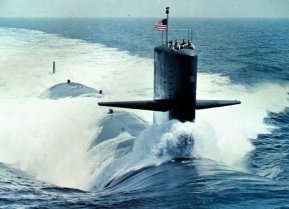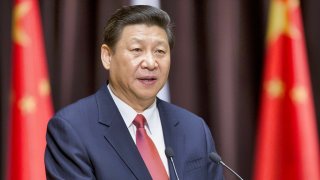Why Does the U.S. Rely on Chinese State-Owned Shipping?
The United States must reevaluate its general willingness to depend on Chinese state-owned enterprises for something as vital as overseas shipping.
In recent years, the Biden administration has promoted the need for “resilient, diverse, and secure supply chains” and urged the identification of vulnerabilities that could affect the country’s national security. Interestingly, one of the most visible components in the nation’s supply chain—ocean shipping—matches this description yet is rarely afforded the attention it deserves. That’s a costly mistake because Chinese state-owned shipping is thoroughly embedded in and integrated within the logistics infrastructure of the United States and the West more broadly.
Occupying a key position in this landscape is the China Ocean Shipping Company (COSCO), which currently ranks as the fourth largest player by market share in global container shipping. Since 2017, COSCO’s shipping subsidiary has formed the “Ocean Alliance” with the third largest player, a French carrier, in addition to two smaller carriers. By early 2025, this bloc is expected to be the largest in the ocean freight industry, and their alignment (which was renewed this year) is set to last until at least 2032. Together, the alliance controls approximately 30 percent of the maritime shipping market—a formidable amount, given ocean freight represents 80 percent of all global trade volume.
To this day, however, the entire U.S. and Western private sector treats COSCO as if it were any other shipping line. Virtually the entire logistics industry widely considers the company to be both reputable and price-competitive. By and large, U.S. and Western companies ignore the fact that the shipping line belongs to a Chinese state-owned enterprise.
This contradicts a core tenet of supply chain resilience and can pose an economic security challenge for the U.S. That’s because, as Western reliance on Chinese state-owned shipping grows, the magnitude of potential disruption increases as well.
In the short run, the ultimate ownership of one’s cargo ships may not appear to matter. This, however, is liable to change if relations further deteriorate and tensions escalate between Washington and Beijing. If Western companies wait until an actual conflict to diversify their shipping appropriately, there is a good chance they may face a significant shock in freight prices when they do—as well as a shortage in available worldwide shipping capacity. At that point, the U.S. supply chain for products ranging from commodities to food to industrial goods can face serious disruptions, and at precisely the time when it will be most inconvenient). Exacerbating this is the fact that new cargo ships often take years to build, with new orders frequently going straight to multiyear backlogs and with more than 50 percent of new tonnage currently produced in China.
The next administration must begin thinking creatively to ameliorate these industrial vulnerabilities. The United States, working with partners like South Korea, needs to have the capacity to manufacture state-of-the-art commercial vessels in something approaching real-time. The U.S. manufacturing workforce must grow to meet this demand, with a concomitant investment in apprenticeship and non-traditional educational pathways to supply these needed workers.
While some may recoil at this sort of “industrial policy,” only a serious investment in such capabilities at the federal level can begin to lessen the dependence the West currently faces in regard to Chinese oceangoing shipping. To boot, the United States would be wise to reevaluate its general willingness to use Chinese state-owned enterprises for something as vital as overseas shipping. The “business as usual” mindset—currently endemic in much of the West—is engendering a blind spot in plain sight that risks growing over time. If ignored, it may well impede the supply chain resilience that’s necessary for the nation’s economic security at precisely the time when the United States can afford it least.
About the Authors:
Alexander B. Gray, a senior fellow in national security affairs at the American Foreign Policy Council, served as deputy assistant to the president and chief of staff of the White House National Security Council (2019-21) and special assistant to the president for the defense industrial base (2017-18).
Andrew Liang, a fellow in Asia studies at the American Foreign Policy Council, has been a private equity investor and investment banker focusing on the global industrial sector.
Image: Creative Commons.


